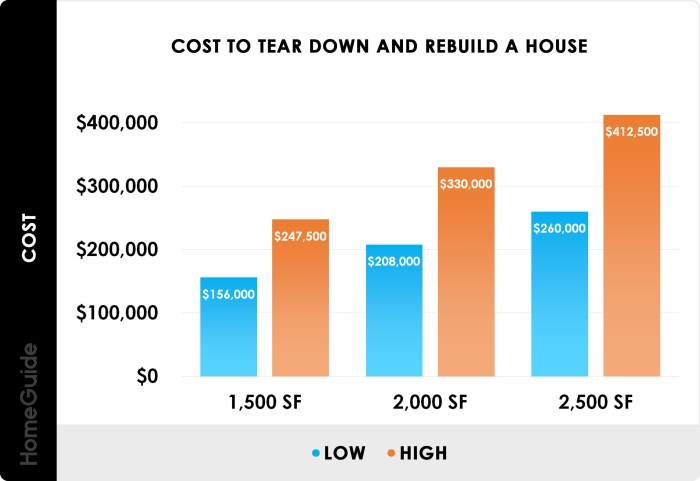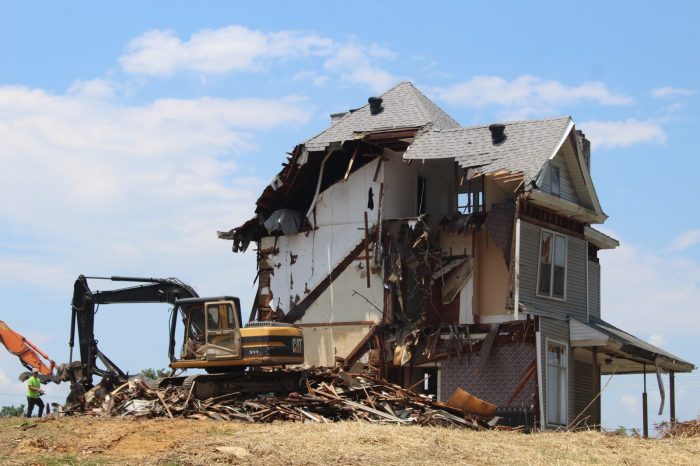Exploring the Costs of Home Demolition and Rebuilding

Home demolition and rebuilding costs are a crucial aspect of any renovation or construction project. From factors influencing costs to strategies for saving money, this topic delves into the intricacies of budgeting for such endeavors.
Factors Affecting Home Demolition and Rebuilding Cost

When it comes to the cost of demolishing and rebuilding a home, several key factors play a significant role in determining the overall expenses. These factors can range from the location of the property to the materials used in construction.
Location of the Property
The location of the property has a substantial impact on the cost of home demolition and rebuilding. Urban areas with higher property values and strict building regulations may result in higher costs compared to rural areas. Accessibility to the site, permits required, and local labor costs can all vary based on the location, influencing the final expenses.
Size and Layout of the Home
The size and layout of the home also play a crucial role in determining the cost of demolition and rebuilding. Larger homes with intricate layouts or multiple stories will require more labor, time, and materials, consequently increasing the overall expenses.
Factors like the presence of basements, attics, and special architectural features can also impact the cost.
Materials Used in Construction
The materials used in construction significantly affect the final expenses of home demolition and rebuilding. High-quality materials such as hardwood floors, custom cabinetry, and premium fixtures will inevitably raise the overall cost. On the other hand, opting for more budget-friendly materials can help reduce expenses without compromising on quality.
It's essential to consider the longevity, durability, and aesthetic appeal of the materials when determining the budget for the project.
Cost Estimation Methods
When it comes to estimating the cost of home demolition and rebuilding, there are several approaches that can be used to ensure accurate projections. Utilizing the right methods and tools can make a significant difference in the overall budget planning process.
Traditional Estimation Methods
Traditional methods of cost estimation involve analyzing the project requirements, materials needed, labor costs, and any additional expenses that may arise during the demolition and rebuilding process. This approach relies on the expertise of professionals in the field to provide a detailed breakdown of the costs involved.
Cost Estimation Tools and Software
In today's digital age, there are various cost estimation tools and software available to help streamline the process and provide more accurate projections. Some commonly used tools in the industry include:
- RSMeans: A comprehensive database that provides cost information for materials, equipment, and labor.
- Xactimate: Software specifically designed for estimating construction and rebuilding costs, including detailed pricing for materials and labor.
- Clear Estimates: An easy-to-use software that allows for quick and accurate cost estimation for home remodeling projects.
Importance of Obtaining Multiple Quotes
Obtaining multiple quotes from different contractors or service providers is crucial in ensuring accurate cost projections for home demolition and rebuilding. By comparing quotes, homeowners can get a better understanding of the overall costs involved and make informed decisions based on the estimates provided.
Impact of Unforeseen Expenses
Unforeseen expenses can have a significant impact on the overall budget for home demolition and rebuilding projects. Factors such as structural issues, permit costs, or unexpected delays can lead to additional expenses that were not originally accounted for in the initial estimation.
It is important to have a contingency fund set aside to cover any unforeseen costs that may arise during the construction process.
Cost-Saving Strategies
When it comes to home demolition and rebuilding, there are several cost-saving strategies that homeowners can consider implementing. These strategies not only help in reducing expenses but also contribute to sustainable practices in construction
Recycling Materials
One effective way to save costs during home demolition is by recycling materials. Salvaging items like doors, windows, fixtures, and even structural elements can significantly lower the overall expenses. These recycled materials can be repurposed in the new construction, reducing the need to purchase new items.
Salvaging and Repurposing Items
Another cost-saving strategy is to salvage and repurpose items from the existing structure. Items like wood flooring, cabinets, and even plumbing fixtures can be salvaged and reused in the new home. This not only saves money but also adds a unique touch to the new construction.
Negotiating with Contractors
Negotiating with contractors is crucial in securing competitive pricing for home demolition and rebuilding. Homeowners can obtain multiple quotes from different contractors and leverage these quotes to negotiate better deals. It's essential to clearly communicate budget constraints and explore cost-saving options with contractors to ensure the project stays within budget.
Legal and Regulatory Considerations

When embarking on a home demolition and rebuilding project, it is crucial to consider the various legal and regulatory aspects that can impact the cost and progress of the construction. From permits to insurance, navigating these requirements is essential for a successful project.
Permits and Approvals
In most jurisdictions, obtaining permits and approvals for home demolition and rebuilding projects is mandatory. These permits typically involve detailed plans, environmental impact assessments, and compliance with zoning laws and building codes. Failure to secure the necessary permits can result in fines, delays, or even a halt to the construction process.
Zoning Laws and Building Codes
Zoning laws and building codes dictate the parameters within which a home can be demolished and rebuilt. These regulations can impact the cost of the project by requiring specific materials, design elements, or structural considerations. Ensuring compliance with these laws from the outset can help avoid costly modifications later on.
Role of Insurance
Insurance plays a critical role in protecting homeowners during the construction phase. Construction insurance, such as builder's risk insurance, can provide coverage for property damage, theft, and liability risks. It is essential to review insurance policies carefully and ensure adequate coverage is in place before starting the project.
Navigating Legal Aspects
To avoid unexpected expenses related to legal issues, homeowners should work closely with contractors, architects, and legal professionals to ensure compliance with all regulations. This may involve conducting thorough research, seeking legal advice, and keeping communication lines open with relevant authorities throughout the project.
Ultimate Conclusion
In conclusion, understanding the various factors and methods involved in calculating home demolition and rebuilding costs is essential for anyone embarking on such a project. By implementing cost-saving strategies and considering legal aspects, homeowners can navigate this process with greater ease and efficiency.
Question & Answer Hub
What are some key factors influencing home demolition and rebuilding costs?
Factors such as property location, home size, materials used, and unforeseen expenses can significantly impact the overall cost.
How can homeowners save money on home demolition and rebuilding projects?
Homeowners can save money by recycling materials, salvaging items, and negotiating with contractors for competitive pricing.
What legal considerations are important for home demolition and rebuilding?
Obtaining permits, understanding zoning laws, complying with building codes, and having appropriate insurance coverage are key legal aspects to consider.




